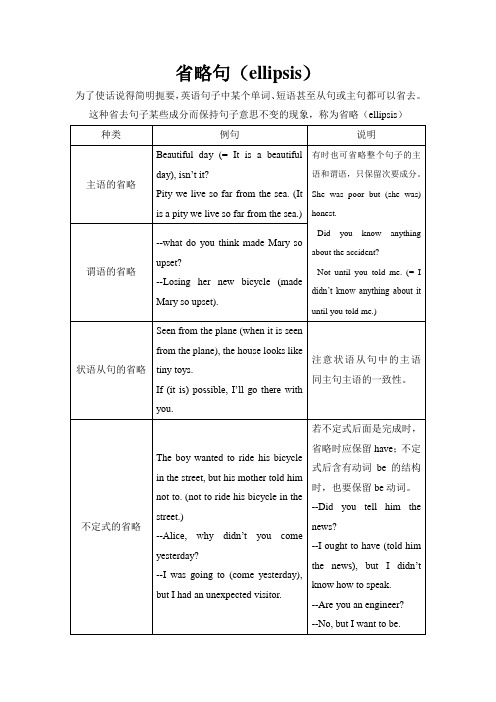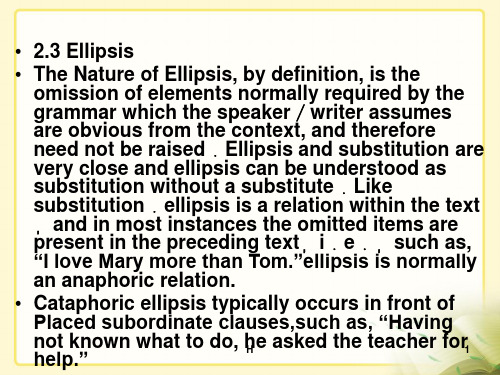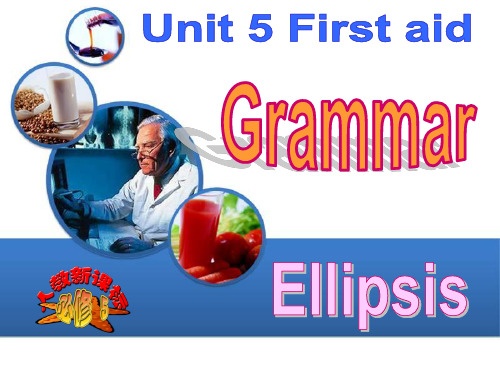语法 Ellipsis 省略句
- 格式:ppt
- 大小:496.00 KB
- 文档页数:23

省略句(ellipsis)为了使话说得简明扼要,英语句子中某个单词、短语甚至从句或主句都可以省去。
这种省去句子某些成分而保持句子意思不变的现象,称为省略(ellipsis)Ⅰ、状语从句中的省略用法一、如果从句的主语和主句的主语一致,且从句的谓语含有be动词的某种形式(am/is/are/was/were),可同时省略从句的主语和be动词的某种形式。
1、when,while引导的时间状语从句e.g. When/While (I was) on my way to work, I met her.2、if,unless,once引导的条件状语从句e.g. If (it is) properly treated, waste will do no harm to the environment.I’ll not go to the party unless (I am) invited.Once (you are) caught stealing in a supermarket, you will be punished.3、though,although,whether,no matter whether/what/how/who等引导的让步状语从句e.g. He was happy, though/although (he was) poor.Whether (she is) sick or well, she is always cheerful.No matter how/However hard the task (is), we must fulfill it in time.(注:从句的主语和主句的主语不一致时,只省略从句中的be动词形式)4、as if,as though引导的方式状语从句e.g.He stood up as if/though (he wanted) to leave.(as if/though + to do表示一个将来的动作)二、than引导的比较状语从句中的省略用法:当不同的主语进行比较时,一般省略从句中的谓语;e.g. He is taller than his brother (is).三、以if从句为代表的状语从句中的特殊省略用法:通常省略了it is,that is,there is/are。

省略号(ellipsis)的中间及前后是否要留空格?凌哥,在英⽂写作中,省略号(ellipsis)的中间及前后是否要留空格?谢谢!您好!在英语书写中,省略号是3个点。
在电脑系统中,省略号是⼀个字符,看起来是连续的3个点…(中⽂连续2次字符,即6个点……),中间不存在空格。
但是,在英⽂输⼊中,很多⼈会直接输⼊3个句点...(MS Word中会⾃动替换成⼀个省略号字符…)。
也有⼈会输⼊ . . . (即:句点+空格+句点+空格+句点)。
国外的出版界会有不同的要求。
The Chicago Manual of Style calls for spaces between each ellipsis point.The AP Stylebook says to treat the ellipsis as a three-letter word, with spaces on eitherside of the ellipsis but no spaces between the dots.这只是风格的差异,也是不同的排版要求,对于识别和认知的影响不⼤。
According to various style guides, an ellipsis is three periods, with a space inbetween each [ . . . ].In general, there is also a space before and after the ellipsis.下⾯是3个实例:(点击图⽚,双指放⼤)我国的英⽂出版物中,省略号内部⽆空格,省略号与前后的单词之间通常需要空开⼀个字符,尤其是前⾯有逗点、句点等标点的情况下,如果不留空格,容易造成视觉不适。
请⽐较:He said,...is the most important.He said, ... is the most important.其实道理很简单啊,正如AP Stylebook说的,⼀个省略号就相当于是⼀个单词,那么单词和单词之间就需要空格了。

英语省略句总结省略句(elliptical sentences)省略(ellipsis)是一种为了避免重复、突出新信息并使上下文紧密连接的语法手段。
祁使主语必省略,比较than后须省略。
宾从表从that省略,主从that勿省略。
前后出现同一词,惯用习语常省略。
1.简单句中的省略1.省略主语(多数属于语境省略)有时,主语和助动词一起省略。
(It) Doesn’t matter. 没关系。
(I)Beg your pardon. 请原谅。
(You)Had a good time?你玩的痛快吗?(I’m)Sorry.对不起。
Looks as if it will rain. 看起来象要下雨。
(Looks前省略了主语it)(Have you)Got any idea?你有什么注意吗?What a beautiful view!多美的景色啊!2.省略了谓语Who next? 该谁了?(Who后面省略了谓语comes)The river was deep and the ice thin. (ice后面省略了was)We’ll do the best we can. 我们将尽力而为。
(can后面省略了动词do)3.省略了宾语Let’s do the dishes. I’ll wash and you’ll dry.让我们洗碗吧,我来洗,你来揩干。
(wash和dry后面省略了宾语dishes)4.省略了表语Are you ready? Yes, I am. 你准备好了吗?我准备好了。
(am后面省略了ready)He was a lover of sports as he had been in his youth.他还是象年轻时那样,是一位运动爱好者。
(had been后面省略了a lover of sports)5.省略了状语He was not hurt. Strange! 他没有受伤,真奇怪!(Strange前面省略了状语how)6.同时省掉句子几个成份。


省略(Ellipsis)为了使语言简练或避免重复,省略句中的一个或几个成分,可以是主语、谓语或谓语的一部分、宾语、主语和谓语或主语和谓语的一部分,这种语法现象称为省略.一、简单句中的省略1.在对话中--How is your mother today?--(She is ) much better.2.在祈使句中(Y ou) open the door, please.3.在感叹句中What a (good) boy (he is)!How (hard) they are working!4.表示讲话人的意见和看法(It) sounds fine to me.(It’s a) pity you couldn’t come.5.提问(Is there) anything wrong?(Have you) found the bike?6.名词所有格修饰的名词若表示店铺,住宅,教堂或上下文已暗示或明确指出过的事物At her mother’s (house) she passed many happy days.I met him at the doctor’s(house.)____________________________________________.7.在like, expect, manage, love, want, wish, refuse, try, forget, hope, intend, mean, prefer, seem等后面常省略动词不定式,只保留不定式符号。
如:--- Will you go to the cinema with me?--- I’d love to.如果to 后面的动词是b e或have 一般不省略。
如:Our hometown is no longer what it used to be._______________________________________. He didn’t finish the work yesterday, but he ought to have (finished the work).二、并列句中的省略1.后面分句中与前面相同的部分常被省略She was poor but (she was) honest.She is not fond of cooking, nor am I(fond of cooking).__________________________________. 2.有时并列句中的省略部分出现在前面的分句中,看完最后一个分句才能掌握全句的完整意义。

省略(Ellipsis)英语中,有时为了避免重复,使讲话和行文简洁,明了,常常将句子的某些部分省略去,这种现象叫做省略。
一般说来,只要不影响句子的主要结构或产生歧义,句子中的某些成分常可省略。
一、简单句的省略1.省略主语⑴Thank you for your help. ⑵Sit down, please. ⑶See you later. ⑷Doesn’t matter.⑸(That/It )Sounds like a good idea.2.省略主语和谓语(部分)⑴(Is there)Anything else? ⑵(You come/ walk) This way, please. ⑶What a wonderful victory (it is)!⑷—I am going to Guilin. —When (are you going to Guilin)? —Tomorrow.⑸—Are you feeling better now? —(I am feeling) Much better(now).⑹(Are you)Going home? ⑺(I beg)Your pardon.⑻—Have you finished your work ? —(I have) Not (finished my work) yet.3.省略宾语⑴—Do you know the man? —No, I don’t know (the man).⑵—Which one is better? —It’s hard to tell (it).⑶Tom enjoys dancing, but Peter hates.4.省略表语⑴—Are you thirsty? —Yes, I am (thirsty). ⑵His brother isn’t lazy, nor is his sister (lazy).5.不定式的省略①不定式后面的动词的省略,例如expect, forget, hope, intend, like, love, mean, prefer, refuse, seem, want, try,wish, tell, advise, warn, order等.⑴I asked her to see a film, but she didn’t want to. ⑵—Would you like to play football? —Yes, I’d love to.⑶I will go if you wish me to (go).②have, need, ought to, be going, used等词后面省略动词.I didn’t want to go there, but I had to.③在某些形容词如afraid, glad, happy, pleased, delighted等之后.—Will you join in the game? —I’d be glad to.④如果不定式后含有be, have, have been等词,通常保留be, have, have been.⑴—Are you a doctor? —No, but I used to. ⑵—He hasn’t finished the task yet. —Well, he ought to have.⑶My homework has not been finished now and it should have been last night.⑸介词but/except前若有动词do,后面的不定式不带to.The boy did nothing but play.⑹在and 或or连接的不定式并列结构中,第二个不定式的to通常省去I told him to sit down and wait for a moment.二、并列句中的省略⑴Tom got up early, put on his coat, and went out. ⑵Li Ming was born in 1990 and his brother in 1995.⑶I study at college and my sister (studies) at high school.三、复合句中的省略1.宾语/主语从句中⑴Tom was sad, but I don’t know why (he was sad).⑵He told me (that) he was from Tianjin and that he was going to stay here for another week.⑶( It’s a ) Pity that he missed such a good chance.2.时间状语从句(when, while, as, until, once, after, before), 条件状语从句(if, unless), 让步状语从句(though,although), 方式状语从句(as if, as though).⑴Work hard when ( you are) young, or you will regret. If (you are) asked you may come in.⑵He looked everywhere as if (he was) in search of something.⑶While ( I was) walking along the street, I heard my name called.⑷He opens his mouth as if (he were ) to speak..⑸If (it is ) necessary, I’ll explain to you again.⑹When ( it is ) possible, please see me later.3.另外,我们还可以用so或not代替上下内容,此时可有if so/ not省略.⑴Get up early tomorrow. If not (you do not get up early), you will miss the first bus.⑵—She must be busy now. —If so, she can’t go with us.⑶—Is he coming back tonight? —I think so ⑷–Is she feeling better today?—I’m afraid not.⑸—Do you think he will attend the meeting?—I guess not.4.主语从句中有动词do,后面作表语的不定式的to可带可不带。
2022届高考英语语法复习:省略(ELLIPSIS)讲义一、不用替代词的省略1.主语(You)Had a good time,did you?玩得挺好,是吗?(It) Seems easy.似乎很容易。
(It) Sounds funny.听起来很滑稽。
(It)Looks like they are okay.看上去不错。
(You)Stop quarreling.别吵了。
(We) Must be back before noon.中午前必须赶回来。
2.谓语All aboard!全都上船/车/飞机!(=All come aboard.)Pardon?您说什么?(=Beg pardon?)A:What happened?出了什么事?B: Nothing (happened).没什么事。
3.主语和部分谓语Well done! 干得好!(=That's well done!) Coming tomorrow.我明天来。
(=I'm coming tomorrow.) Seen Mary?看见玛丽了吗?(=Have you seen Mary?)(Have you) Heard anything of Bob lately?最近听说过鲍勃的事情吗?(He was) Feeding the birds,wasn't he?他在喂鸟,是吗?(It is) My mistake.是我的错。
(It is) Very kind of you to help me.你帮助我真是太好了。
A: Do you mind my smoking here?你介意我在这里抽烟吗?B: Yes. (You'd) Better not.是的,最好不要抽。
4.助动词或be动词(Do)You understand?懂吗?(Have) Children done their homework?孩子们做完作业了吗?Sam (will) be back today, will he?萨姆今天回来,是吗?Children (are) out with Aunt,are they?孩子们同保姆出去了,对吗?5.There (be)(There's) Nothing wrong.没什么问题。